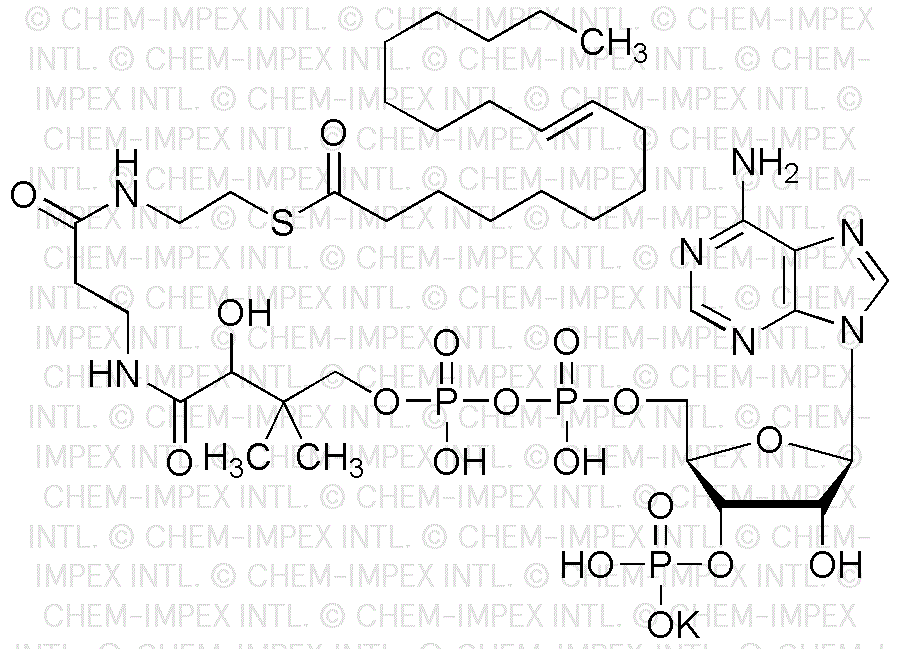Oleoyl coenzyme A potassium salt is widely utilized in research focused on:
- Metabolic Studies: This compound plays a crucial role in fatty acid metabolism, making it essential for researchers studying energy production and metabolic pathways in cells.
- Drug Development: Its involvement in lipid metabolism aids pharmaceutical companies in designing drugs that target metabolic disorders, providing a pathway for innovative treatments.
- Biochemical Assays: Used in various assays to study enzyme activity related to lipid synthesis, it helps researchers understand the mechanisms of diseases linked to lipid metabolism.
- Cell Culture Applications: In cell biology, it serves as a supplement in culture media, promoting cell growth and differentiation, particularly in studies involving adipocytes (fat cells).
- Nutrition Research: It is utilized in studies examining the effects of dietary fats on health, offering insights into how different fatty acids influence metabolic health and disease prevention.
Informations générales
Propriétés
Sécurité et réglementation
Applications
Oleoyl coenzyme A potassium salt is widely utilized in research focused on:
- Metabolic Studies: This compound plays a crucial role in fatty acid metabolism, making it essential for researchers studying energy production and metabolic pathways in cells.
- Drug Development: Its involvement in lipid metabolism aids pharmaceutical companies in designing drugs that target metabolic disorders, providing a pathway for innovative treatments.
- Biochemical Assays: Used in various assays to study enzyme activity related to lipid synthesis, it helps researchers understand the mechanisms of diseases linked to lipid metabolism.
- Cell Culture Applications: In cell biology, it serves as a supplement in culture media, promoting cell growth and differentiation, particularly in studies involving adipocytes (fat cells).
- Nutrition Research: It is utilized in studies examining the effects of dietary fats on health, offering insights into how different fatty acids influence metabolic health and disease prevention.
Documents
Fiches de données de sécurité (FDS)
La FDS fournit des informations de sécurité complètes sur la manipulation, le stockage et l’élimination du produit.
Spécifications du produit (PS)
Le PS fournit une description complète des propriétés du produit, notamment sa composition chimique, son état physique, sa pureté et les exigences de stockage. Il détaille également les plages de qualité acceptables et les applications prévues du produit.
Certificats d'analyse (COA)
Recherchez des certificats d'analyse (COA) en saisissant le numéro de lot du produit. Les numéros de lot et de lot se trouvent sur l'étiquette d'un produit, après les mots « Lot » ou « Lot de fabrication ».
Numéro de catalogue
Numéro de lot/série
Certificats d'origine (COO)
Ce certificat d'exploitation confirme le pays dans lequel le produit a été fabriqué, et détaille également les matériaux et composants utilisés et s'il est issu de sources naturelles, synthétiques ou autres sources spécifiques. Ce certificat peut être requis pour les douanes, le commerce et la conformité réglementaire.
Numéro de catalogue
Numéro de lot/série
Fiches de données de sécurité (FDS)
La FDS fournit des informations de sécurité complètes sur la manipulation, le stockage et l’élimination du produit.
DownloadSpécifications du produit (PS)
Le PS fournit une description complète des propriétés du produit, notamment sa composition chimique, son état physique, sa pureté et les exigences de stockage. Il détaille également les plages de qualité acceptables et les applications prévues du produit.
DownloadCertificats d'analyse (COA)
Recherchez des certificats d'analyse (COA) en saisissant le numéro de lot du produit. Les numéros de lot et de lot se trouvent sur l'étiquette d'un produit, après les mots « Lot » ou « Lot de fabrication ».
Numéro de catalogue
Numéro de lot/série
Certificats d'origine (COO)
Ce certificat d'exploitation confirme le pays dans lequel le produit a été fabriqué, et détaille également les matériaux et composants utilisés et s'il est issu de sources naturelles, synthétiques ou autres sources spécifiques. Ce certificat peut être requis pour les douanes, le commerce et la conformité réglementaire.


